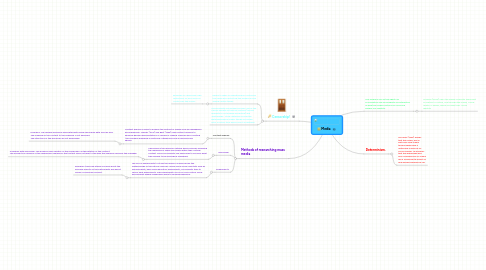
1. Censorship!
1.1. Refers to ways of regulating and controlling the media and restricting the audience from seeing certain things.
1.1.1. examples of censorship: Age restrictions on films such as "South Park the movie"
1.2. Governmental censorship includes use of the official secrets act and DA Notices (official requests to not publish and article) and "watchdogs". Other methods include the watershed which means things are shown after a certain time which aren't acceptable.
2. Methods of researching mass media
2.1. Content analysis
2.1.1. Content analysis is used to analyse the content of media such as newspapers and magazines. Lobban (1974) and Best (1993) used content analysis to examine gender representations in children's reading schemes bye counting the numbers appearing in particular categories such as heroines and heroes.
2.1.1.1. Problems: The general problems associated with using secondary data such as bias. The meaning of the content to the audience is not explored. The intentions of the producer are not addressed.
2.2. Semiology.
2.2.1. Semiology is the research method which involves analysing the meanings of signs and codes within their cultural context. Some sociologists use semiology to uncover what they believe to be ideological messages.
2.2.1.1. Problems with semiology: The analysis relies greatly on the researcher's interpretation of the content. The presents an analysis of the researchers reading of the text but does not refer to the way the audience receives the message.
2.3. Experiments.
2.3.1. The use of experiments to study the media is influenced by the methodology of the natural sciences. While some social scientists such as psychologists, have used laboratory experiments, sociologists then to favour field experiments. Field experiments occur in more natural social environment where researchers hope to observe behaviour.
2.3.1.1. problems: there are ethical cocerns about the possible effects on the participants and about issues of informed consent.
